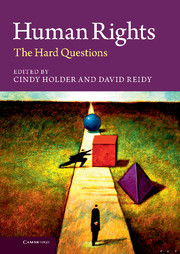Book contents
- Frontmatter
- Contents
- Figure
- List of table
- Notes on contributors
- Introduction
- Part I What are human rights?
- Part II How do human rights relate to group rights and culture?
- Part III What do human rights require of the global economy?
- Part IV How do human rights relate to environmental policy?
- Part V Is there a human right to democracy?
- Part VI What are the limits of rights enforcement?
- Part VII Are human rights progressive?
- 21 Moral progress and human rights
- 22 Human rights and moral agency
- 23 Gender mainstreaming human rights
- Afterword Rights, practice, reality and hope
- Index
- References
21 - Moral progress and human rights
Published online by Cambridge University Press: 05 May 2013
- Frontmatter
- Contents
- Figure
- List of table
- Notes on contributors
- Introduction
- Part I What are human rights?
- Part II How do human rights relate to group rights and culture?
- Part III What do human rights require of the global economy?
- Part IV How do human rights relate to environmental policy?
- Part V Is there a human right to democracy?
- Part VI What are the limits of rights enforcement?
- Part VII Are human rights progressive?
- 21 Moral progress and human rights
- 22 Human rights and moral agency
- 23 Gender mainstreaming human rights
- Afterword Rights, practice, reality and hope
- Index
- References
Summary
This chapter makes the case that the concept of human rights on which the modern international human rights enterprise is grounded is morally progressive. I first clarify the idea of moral progress. Next, I focus on what I take to be some of the most important improvements in thinking about justice and explain how they are connected to one another. Then, I show that the modern conception of human rights encompasses all of these improvements.
My account of moral-conceptual progress will be neutral on the crucial question of causal relations between changes in normative ideas and interests or other so-called “material” factors. What I will say is compatible with both the view that the moral-conceptual changes I describe played a major causal role in progressive institutional change (such as the abolition of slavery) and with the view that they were largely post-hoc responses to institutional change caused by realignments of interests, as well as with a range of more nuanced alternative views that allow complex reciprocal causality between normative beliefs and interests. It will also be compatible with a sensible rejection of the facile distinction between normative beliefs and interests on the basis of which the question of causality is usually framed.
- Type
- Chapter
- Information
- Human RightsThe Hard Questions, pp. 399 - 417Publisher: Cambridge University PressPrint publication year: 2013
References
- 8
- Cited by

